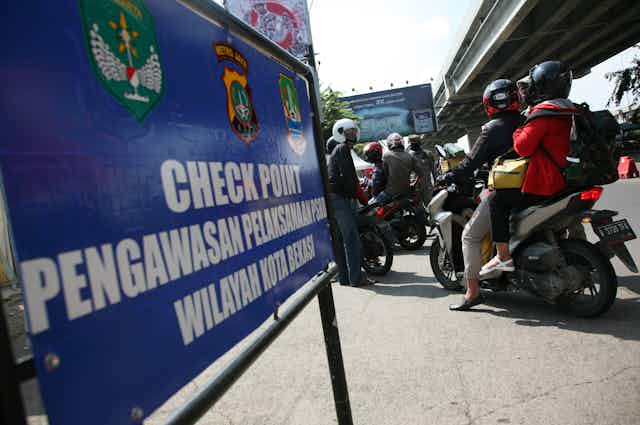The Indonesian government’s plan to allow 500 foreign workers from China to enter the country amid the COVID-19 pandemic has ignited debates and criticism in Indonesia.
Even though an arrival date has yet to be confirmed, Indonesians fear the workers might put them at risk of contracting the novel coronavirus, which first broke out in Wuhan, China.
People question the move when Indonesia has the most COVID-19 cases in Southeast Asia, and that figure continues to increase daily.
The timing is also puzzling as the government granted permission when implementing its partial lockdown policy to overcome the COVID-19 outbreak.
This move indicates the government is giving priority to the economy over its own people’s well-being during this pandemic. It threatens to tarnish the government’s image among its people and also to worsen the widespread polemics against Chinese workers in the country. Their numbers have grown significantly in the past few years.
Economy over the people
Since the start of the outbreak, the Indonesian government has consistently shown it cares more for the economy than the health of its people.
In the early days of the pandemic, the government even allocated US$4.9 million to boost the tourism sector to avoid a negative impact from the coronavirus outbreak rather than spending it on health facilities. The initiative, designed to attract more foreign tourists, was later postponed under pressure from the public.

The decision to welcome workers from China is based on economic considerations. Coordinating Minister for Maritime and Investment Affairs Luhut Binsar Pandjaitan explained that the move was intended to help the country’s economy, which continues to be affected by the COVID-19 pandemic.
It is estimated Indonesia’s economy will grow by 2.25% from a four-year low of 5.02% in 2019. Some have predicted the economy will collapse in the second and third quarters of this year.
Saving the economy from the impacts of COVID-19 may not be wrong, especially for the long-term well-being of the country. However, the government should not shift its focus away from stopping the increasing number of COVID-19 cases, particularly as the virus has spread to almost all provinces and its handling of COVID-19 has been haphazard.
COVID-19 will remain in Indonesia and continue to negatively impact the people, and the economy, unless the government focuses on stopping its spread.
New research, using data from the 1918-1919 flu pandemic in the US, demonstrates that cities that prioritised people’s health over the economy had more economic growth afterwards.
Worsening hostility to Chinese workers in Indonesia
There is a long-held anti-Chinese sentiment in Indonesia since the dictatorial regime of Soeharto.
The government’s move to admit Chinese workers at a time when its response to COVID-19 has been abysmal would complicate the politics of Chinese workers in Indonesia.
China’s massive infrastructure projects in Indonesia, under its Belt and Road Initiative (BRI), have increased the number of Chinese workers in Indonesia as part of these deals.
Chinese workers in Indonesia accounted for 30% – about 32,000 people – of the foreign workers in the country in 2018. That’s an increase of about 8,000 workers from the previous year, making them the largest group of foreign workers in Indonesia.
Many of these jobs are mid-level, professional positions that Indonesia would struggle to fill using its local workforce, but some are low-skilled labourers.
The Centre for Strategic and International Studies reported last year that tensions have been on the rise between locals and Chinese workers in areas where Chinese projects are located. Some local officials have called on Jakarta to limit the entry of foreign workers as their regencies had been experiencing lay-offs.
In addition to underlying anti-Chinese sentiments in Indonesia, the dominance of Chinese workers has drawn negative reactions from the public, who fear the Chinese may take over their jobs.
Most Indonesians work in agriculture, but the sector contributes just 9.5% of the nation’s GDP. Both pay and levels of education tend to be low. And while the unemployment rate has been falling, the decrease has slowed markedly.
Solutions
Undoubtedly, China and Indonesia need one another.
China needs to complete its projects to realise the BRI, while Indonesia needs Chinese investment. But both need to tread carefully.
The Indonesian government should choose a more appropriate time for allowing workers from China to enter Indonesia. China also needs to monitor its workers’ activities, so they obey local regulations and do not add to negative sentiments among the locals.
In late March, 39 Chinese workers arriving in Bintan in the Riau Islands province were refused entry because the employers did not have a permit to employ foreign workers.
Recently, the Central Sulawesi government ordered 10 Chinese workers to return to their camp in Kendari, in neighbouring Southeast Sulawesi. They had insisted on going to work at a site in North Morowali regency despite the authority’s instruction to stay at home due to the pandemic.
China and Indonesia need to ensure that Chinese workers, their employers and the governments themselves not do anything beyond the law or that may cause pushback from local communities such as the recent move.
In the long term, Indonesia also needs to learn from other countries in negotiating with China.
Some Gulf countries, for example, require Chinese companies to partner their national firms to run their business, to recruit local workers for managerial positions and to train local workers to be employed.
China should also consider such demands as it does with its investments in other countries.

Without such steps, the politics of Chinese workers in Indonesia will become more complex and face further backlash from the people.
Such public rejection would create an unpleasant environment for Chinese investments and could worsen Indonesia’s economy, which is heavily dependent on China.
Dimas Rizki Permadi, a Universitas Islam Indonesia graduate, co-authored this article.


